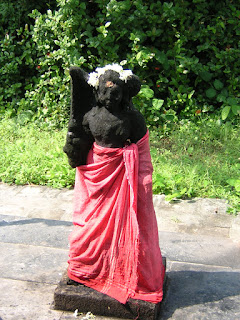Our Village deities
Visiting Village deities is always a ritual and especially before any auspicious occasion in the family, the South Indian families are particular in seeking the deities blessings.
Our village deities are not very famous and therefore I decided to write a blog on them.
They are located in Pachur, not a very well known a small village/hamlet in Manachanellur Block in Tiruchirappalli (Trichy) district in Tamil Nadu. It comes under Kovathangudi Panchayat and is 12 km towards north from Trichy, seven km from Manachanellur. From Chennai, it is about 345 km.
In Pachur, the village deities include Sapta Kannigargal (seven female deities), and the village protectors Karuppusamy (also called Chappani, a formless one) and Ayyanar. They are located on the outskirts of the village and we have to cross a canal (which is branched out of the Kollidam river) by foot.
The canal for irrigation diverted from Kollidam river
For the worship of Sapta kannigai (or Seven female deities or virgin mothers) namely Brameshwari, Maheshwari, Vaishnavi, Koumari, Varahi, Indrani and Chamundi, we had bought a red coloured saree.
They are placed in a small temple along with Lord Ganesha (on the side) and looked after by a local non-brahmin priest and I was touched by his devotion and simplicity.
Ganesh idol is seen on the right side of the Sapta kannigai
The worship pattern is non-agamic. The deities are offered all kinds of flowers, Banana and coconuts after draping the new red coloured saree on all the seven deities.
There is no electricity inside the temple and only through an oil lamp burning, we could see the deities. surrounding this temple there are statues of protectors with Aurval in their hands.
Few yards from this temple, in an open space, we went to worship Karuppusami or Karuppanar, village protector. Karuppu means black in Tamil.
Karuppannar worship, I was told, is a very ancient clan-based system and priests are non-brahmins and derive from local lineages that had initiated the system. The maintenance of the temple is taken care of the whole village.
Karuppusamy is also called as Chappani (picture below) in Pachur which is a formless stone and is decorated with clothes and flowers.Surrounding this deity are few erected tridents, symbolising protection and devotees pierce lemons on these tridents.
.
Visiting Village deities is always a ritual and especially before any auspicious occasion in the family, the South Indian families are particular in seeking the deities blessings.
Our village deities are not very famous and therefore I decided to write a blog on them.
They are located in Pachur, not a very well known a small village/hamlet in Manachanellur Block in Tiruchirappalli (Trichy) district in Tamil Nadu. It comes under Kovathangudi Panchayat and is 12 km towards north from Trichy, seven km from Manachanellur. From Chennai, it is about 345 km.
In Pachur, the village deities include Sapta Kannigargal (seven female deities), and the village protectors Karuppusamy (also called Chappani, a formless one) and Ayyanar. They are located on the outskirts of the village and we have to cross a canal (which is branched out of the Kollidam river) by foot.
The canal for irrigation diverted from Kollidam river
For the worship of Sapta kannigai (or Seven female deities or virgin mothers) namely Brameshwari, Maheshwari, Vaishnavi, Koumari, Varahi, Indrani and Chamundi, we had bought a red coloured saree.
They are placed in a small temple along with Lord Ganesha (on the side) and looked after by a local non-brahmin priest and I was touched by his devotion and simplicity.
A village woman washing her cattle in the canal
This is the Saptakannagai temple from outside
Steps leading to the temple and on its left are the statues of protectors
The dark door in front is where the deities are placed
The priest doing aarthi
The worship pattern is non-agamic. The deities are offered all kinds of flowers, Banana and coconuts after draping the new red coloured saree on all the seven deities.
There is no electricity inside the temple and only through an oil lamp burning, we could see the deities. surrounding this temple there are statues of protectors with Aurval in their hands.
Few yards from this temple, in an open space, we went to worship Karuppusami or Karuppanar, village protector. Karuppu means black in Tamil.
Karuppannar worship, I was told, is a very ancient clan-based system and priests are non-brahmins and derive from local lineages that had initiated the system. The maintenance of the temple is taken care of the whole village.
Karuppusamy is also called as Chappani (picture below) in Pachur which is a formless stone and is decorated with clothes and flowers.Surrounding this deity are few erected tridents, symbolising protection and devotees pierce lemons on these tridents.
No typical temple structure or gopurams for this deity. The worship pattern here is also is non-Vedic or non-agamic. That is it done through folk tales/songs.
Nowadays, the local priest MrChinnappa (who died recently) had told me that a lot of natives settled in different parts of the country come here and help in revamping the place and help the priest.
In the same premises, there is a big colourful statue of Ayyanar on a horse. He is primarily worshipped as one of the guardian folk deities. Here Ayyanar is flanked by his companions riding horses and elephants
Priest late Mr Chinnappa standing near the Ayyanar's horse
By Lalitha Vaidyanathan













